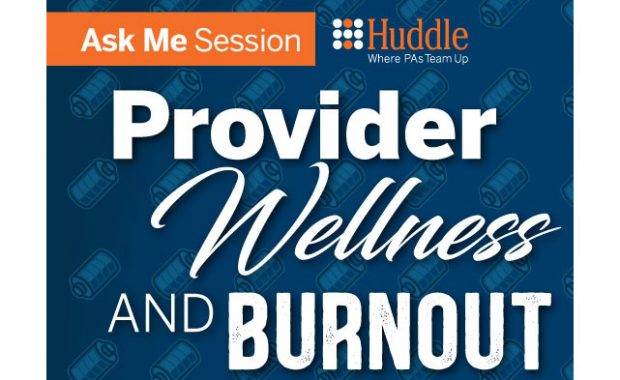Career Resources

8 Networking Tips for PAs
No matter your career stage, networking plays a vital role in landing the position that’s right for you. Join AAPA to access a network that’s 60,000 PAs strong and use these eight tips to help you polish your networking skills.

Sponsored
Locum Tenens Offers Work/Life Balance and a Fresh Start
PAs can turn to locum tenens as a full-time career alternative that allows them to take control of their own schedule, establish a better work/life balance, and enjoy a regular change of scenery.

Getting Ahead of Burnout: Experts Share Tips for Provider Well-being
Huddle’s latest Ask Me session on burnout and clinician wellness enlisted experts Eric Tetzlaff, PA-C, DFAAPA, and Susan Kopynec, MPAS, PA-C Emeritus, DFAAPA, to offer up-to-date information and tips for providers to maintain their well-being and avoid burnout.

How PAs Can Take on More Responsibility Without Burning Out
As we advance in our careers, it’s natural to want to take on more responsibility. But there’s a tricky balance – we don’t want our PA practice or our enthusiasm for healthcare to suffer. Follow these four tips to take on more without burning out.

Sponsored
Why I Changed Specialties as a PA
One of the major advantages of becoming a PA is that it is relatively easy to change from one specialty to another without the need for new certification. More than 50% of PAs will change specialties during their careers, according to AAPA’s Salary Report.

Checklist: Leaving a Job
You will no doubt move through a series of positions in your PA career. Here’s how to make a job transition gracefully with professional bridges intact.

Guide: Planning a Break From Practice
Here are some considerations for PAs who wish to take a break from full-time clinical practice.

Video: Top Tips for a Healthy PA Work Life
Building a rewarding and successful PA career involves more than caring for your patients. We’ve got some expert advice in our video on how to avoid pitfalls, take care of yourself, and establish healthy relationships.

Video: Which Career Path Is Right for You?
There are so many ways to be a PA…from clinical practice in dozens of specialties to non-clinical careers in research and education. Check out our video to help you explore your options and take advantage of tools to help you get there!
Resigning From Employment
Moving on from your current job? We’ve got the guidance – and the checklist – you need on how to transition gracefully, along with tips on what to handle before your final day.
Explaining PA Practice to Employers
Be ready to explain PA practice to potential employers and share the ways you can contribute to medical care.
Guide: Where Will You Take Your PA Career?
Starting out as a PA, you have many options available to you. You can head into a clinical or nonclinical role, and even consider independent contracting. Here’s a list of questions you can ask yourself to help determine where your interests lie.

How to Find Your Voice at the Leadership Table
Looking for ways to ensure that your voice is heard at the leadership table? Alisha T. DeTroye, MMS, PA-C, DFAAPA, director of PA Services at Wake Forest Baptist Health and president-elect of North Carolina Academy of PAs, shares her tips.

Find Your Passion at Any Stage of Your PA Career
Whether you are just starting your PA career, are in mid-practice, or near retirement, be cognizant of what drives and ignites you. By taking inventory, considering new initiatives, and talking to other PAs, you can find your passion.
The Balancing Act
Having the right work-life balance can reduce stress for medical professionals as well as increase on-the-job focus, resulting in high job satisfaction and career success, healthier patients—and a healthier provider. However, maintaining that balance can be more daunting than ever before for those in healthcare.

